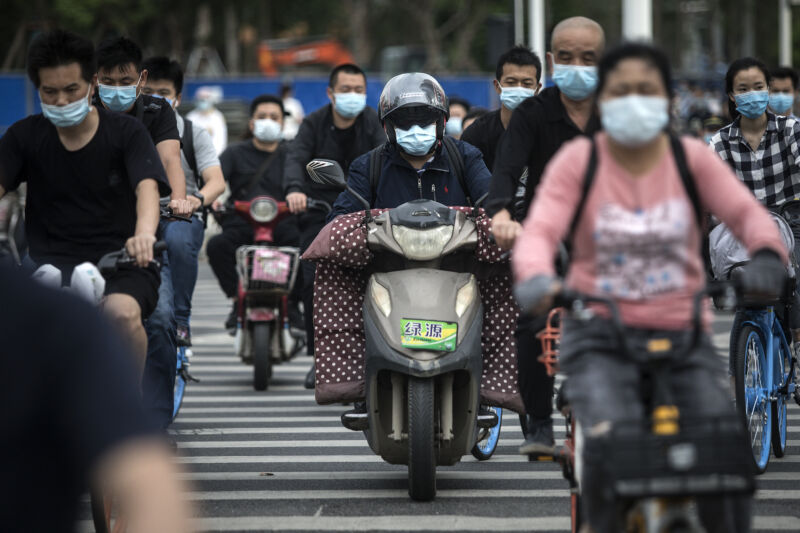The World Health Organization on Monday called for continued vigilance as several areas that have eased lockdown restriction began to see a resurgence in COVID-19 cases—and the United States begins unbuttoning as well.
The Chinese city of Wuhan—where the pandemic began last December—saw its first cluster of cases in at least a month. The city began reopening in early April.
COVID-19 resurges in reopened countries; Wuhan sees first cluster in a month
China ordered all Wuhan residents get tested for COVID-19—that’s ~11 million people.
by Beth Mole -

WUHAN, CHINA - MAY 11: Residents wears face masks while riding their bicycles and scooters. The government has begun lifting outbound travel restrictions after almost 11 weeks of lockdown to stem the spread of COVID-19.
The World Health Organization on Monday called for continued vigilance as several areas that have eased lockdown restriction began to see a resurgence in COVID-19 cases—and the United States begins unbuttoning as well.
The Chinese city of Wuhan—where the pandemic began last December—saw its first cluster of cases in at least a month. The city began reopening in early April.
The cluster was just six cases: an 89-year-old symptomatic man and five asymptomatic cases. All of the infected lived in the same residential community. However, it was enough to spook government officials.
NPR’s Emily Feng reported from Beijing that “the rise of such hard-to-detect asymptomatic cases has alarmed public health authorities in China, who have ramped up contact tracing and testing efforts.”
China state media announced Tuesday that it has ordered all residents of Wuhan—roughly 11 million persons—to be tested within the next 10 days.
Likewise, the mayor of Seoul shut down bars and restaurants over the weekend—just days after South Korea had eased restrictions and allowed businesses to reopen—due to a spike of 86 new COVID-19 cases. Authorities identified a 29-year-old who visited five nightclubs and a bar while infected with the virus, sparking an outbreak of at least 54 cases, according to NPR. The uptick also led South Korean officials to delay the reopening of schools.
Germany, too, saw increases in cases after restrictions eased last week.
“Releasing lockdowns is both complex and difficult,” WHO Director-General Tedros Adhanom Ghebreyesus, who goes by Dr. Tedros, said Monday. What’s happening in these places are “signs of the challenges that may lie ahead.”
Fortunately, all three countries have systems in place to detect and respond to a resurgence in cases,” he added.
Though many areas of the US are beginning to reopen, it is unclear if the country has those systems in place to handle resurgence. In a Senate hearing earlier Tuesday, Dr. Anthony Fauci, the country’s leading infectious disease expert and director of National Institute of Allergy and Infectious Diseases, told Congress that resurgence “absolutely will occur” after we reopen.
“If you do not do an adequate response, we will have the deleterious consequence of more infections and more deaths,” he said.
The Chinese city of Wuhan—where the pandemic began last December—saw its first cluster of cases in at least a month. The city began reopening in early April.
COVID-19 resurges in reopened countries; Wuhan sees first cluster in a month
China ordered all Wuhan residents get tested for COVID-19—that’s ~11 million people.
by Beth Mole -

WUHAN, CHINA - MAY 11: Residents wears face masks while riding their bicycles and scooters. The government has begun lifting outbound travel restrictions after almost 11 weeks of lockdown to stem the spread of COVID-19.
The World Health Organization on Monday called for continued vigilance as several areas that have eased lockdown restriction began to see a resurgence in COVID-19 cases—and the United States begins unbuttoning as well.
The Chinese city of Wuhan—where the pandemic began last December—saw its first cluster of cases in at least a month. The city began reopening in early April.
The cluster was just six cases: an 89-year-old symptomatic man and five asymptomatic cases. All of the infected lived in the same residential community. However, it was enough to spook government officials.
NPR’s Emily Feng reported from Beijing that “the rise of such hard-to-detect asymptomatic cases has alarmed public health authorities in China, who have ramped up contact tracing and testing efforts.”
China state media announced Tuesday that it has ordered all residents of Wuhan—roughly 11 million persons—to be tested within the next 10 days.
Likewise, the mayor of Seoul shut down bars and restaurants over the weekend—just days after South Korea had eased restrictions and allowed businesses to reopen—due to a spike of 86 new COVID-19 cases. Authorities identified a 29-year-old who visited five nightclubs and a bar while infected with the virus, sparking an outbreak of at least 54 cases, according to NPR. The uptick also led South Korean officials to delay the reopening of schools.
Germany, too, saw increases in cases after restrictions eased last week.
“Releasing lockdowns is both complex and difficult,” WHO Director-General Tedros Adhanom Ghebreyesus, who goes by Dr. Tedros, said Monday. What’s happening in these places are “signs of the challenges that may lie ahead.”
Fortunately, all three countries have systems in place to detect and respond to a resurgence in cases,” he added.
Though many areas of the US are beginning to reopen, it is unclear if the country has those systems in place to handle resurgence. In a Senate hearing earlier Tuesday, Dr. Anthony Fauci, the country’s leading infectious disease expert and director of National Institute of Allergy and Infectious Diseases, told Congress that resurgence “absolutely will occur” after we reopen.
“If you do not do an adequate response, we will have the deleterious consequence of more infections and more deaths,” he said.



